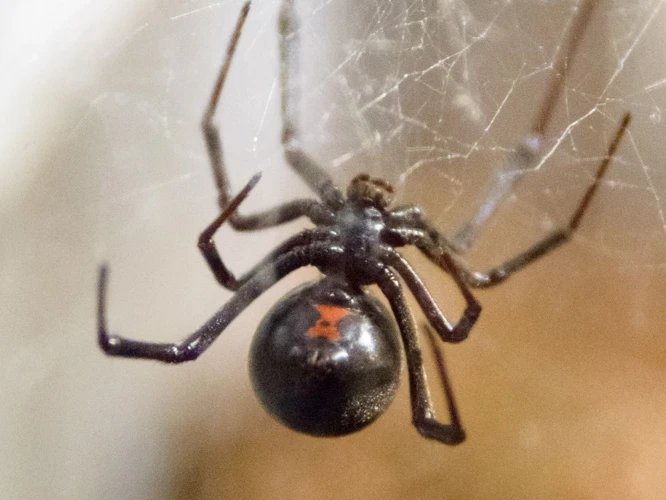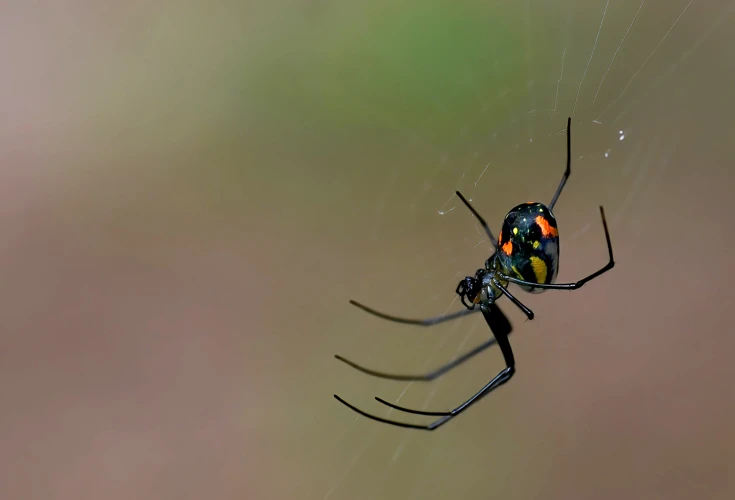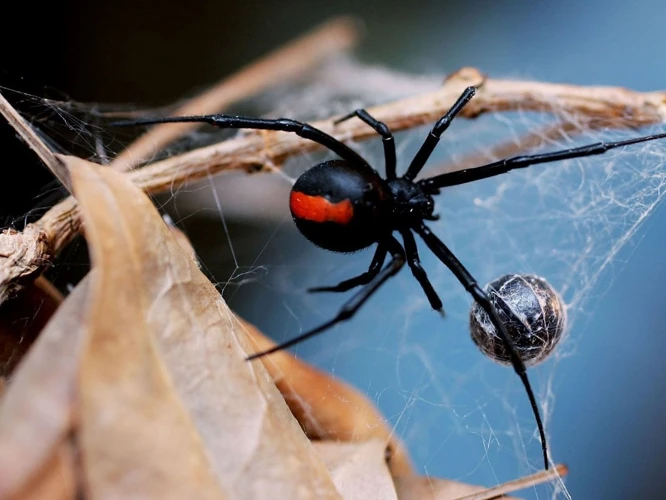Arachnophobia is a common fear among many people, and spiders often get a bad rap for being creepy, crawly, and dangerous. For years, the black widow has been known as one of the most venomous spiders in the world, and people often fear encountering one of these spiders. But is the black widow really the most poisonous spider out there? In this article, we will explore the myth surrounding black widows and their venom, and we’ll reveal the reality about which spiders are truly the most dangerous. So, fasten your seatbelts and let’s uncover the truth about these creepy crawlies.
Myth: Black Widows are the Most Poisonous Spiders

What spider species comes to mind when we think of a venomous spider? The black widow spider is often portrayed as the quintessential venomous spider. It’s a common myth that black widows are the most poisonous spiders in the world. However, is this really the case? In this section, we will explore the myth that black widows are the most poisonous spiders in detail. We will examine what makes a spider venomous, the venom of black widows, and the reality behind this widely held belief. So let’s get started! For more information about other myths and misconceptions about black widows, check out our article that debunks black widow myths.
What Makes a Spider Venomous?
A spider’s venom is what makes it venomous. Venom is a toxin that is injected into its prey or a potential threat via the spider’s fangs. Spiders use their venom to immobilize their prey or defend themselves from predators, making their venom a vital adaptation for survival.
Each species of spider has its own unique venom, and the potency of the venom can vary widely between species. Some spiders have such strong venom that even a small amount of their venom can be lethal to humans.
The composition of spider venom is highly complex and may contain a variety of different toxins, including enzymes and toxins that target the nervous system or cardiovascular system. Black Widow venom, for example, contains a neurotoxin called latrotoxin which can produce symptoms such as muscle pain, spasms, and paralysis.
However, not all spiders are venomous, and even among those that are, the degree of toxicity can vary. While some spiders pack a more potent venom punch than Black Widows, others may have less harmful venom. It’s important to remember that venom potency is not the sole factor in determining the danger a spider poses to humans, as some spiders may not inject venom every time they bite.
The Venom of Black Widows
Black widows possess a neurotoxic venom that affects the victim’s nervous system. The venom of black widows contains several toxins, including alpha-latrotoxin, a protein that triggers the release of neurotransmitters. This protein can cause severe symptoms, including muscle spasms, abdominal pain, and difficulty breathing. Other components of the venom consist of neurotoxins like latrodectin and insecticidal proteins like latroinsectotoxin. These various toxins in the venom work together to cause a variety of symptoms in the victim.
It is important to note that black widow venom can be more dangerous to certain individuals, such as children, elderly, or immunocompromised individuals. Additionally black widow bites can lead to death if not treated immediately. However, it is a myth that black widows are the most poisonous spiders, as there exist several other spider species with more toxic venom. In the next section of this article, we will explore and debunk this myth in more detail.
The following table provides a comparison of venom potency for different spider species:
| Spider Name | LD50 (mg/kg) |
|---|---|
| Black Widow | 0.15 |
| Redback Spider | 0.07 |
| Funnel Web Spider | 0.01 |
| Mouse Spider | 0.0025 |
| Brazilian Wandering Spider | 0.0003 |
LD50 represents the amount of venom (mg) per kilogram of body mass that can lead to death in 50% of the victim population. As seen in the table, black widows indeed possess potent venom, but there are other spiders with more toxic venom. In the next section, we will explore the species that can be considered more poisonous than black widows.
The Reality: Other Spiders are More Poisonous

Despite the popular belief that black widows are the most poisonous spiders, the reality is quite different. In fact, other spiders are more venomous than black widows. While black widows do possess potent venom, there are several species of spiders that can inflict more dangerous bites. It is important to understand and recognize the actual level of danger posed by black widows, as it can help people take the necessary precautions to avoid bites from more dangerous spiders. To learn more about these spiders, you can check out our article on Black Widows vs. Other Dangerous Spiders.
Spider Species with More Toxic Venom
While black widows are certainly venomous and their bites can be dangerous, they are not the most poisonous spiders in the world. In fact, there are several other spider species whose venom is even more toxic to humans. Let’s take a closer look at some of these spiders:
| Spider Species | Toxicity Level | Location |
|---|---|---|
| Brown Recluse Spider | Extremely Toxic | Midwestern and Southern United States |
| Sydney Funnel-web Spider | Highly Toxic | Australia |
| Brazilian Wandering Spider | Highly Toxic | Central and South America |
| Australian Redback Spider | Highly Toxic | Australia |
| Mouse Spider | Highly Toxic | Australia |
The brown recluse spider, for example, is known for causing necrotic wounds that can take months to heal. The Sydney funnel-web spider is so deadly that it has been responsible for more than a dozen deaths in Australia, while the venom of the Brazilian wandering spider can cause paralysis and death if left untreated. The Australian redback spider and mouse spider are also highly toxic and can cause serious symptoms in humans when they bite.
While black widows are certainly something to watch out for, it’s important to remember that there are other spider species that can be even more dangerous. Knowing the signs and symptoms of spider bites and seeking prompt medical attention is always important when dealing with venomous spiders.
The Danger of Black Widow Bites
Black widow bites can be incredibly dangerous, especially for certain individuals. The venom of a black widow spider contains a neurotoxin that can cause painful muscle spasms, nausea, and difficulty breathing. In extreme cases, these bites can even be fatal. The severity of the symptoms can vary based on the age and health of the person bitten, as well as the amount of venom injected.
It is important to seek medical attention immediately if you suspect you or someone else has been bitten by a black widow spider. Symptoms can become more severe over time, so it is better to be safe than sorry.
There are also specific precautions that need to be taken for certain groups of individuals, such as young children, pregnant women, and individuals with weakened immune systems. In these cases, the risks associated with black widow bites can be even more severe.
To avoid risks of black widow bites, try to keep your home free of clutter and debris, as these are common places for these spiders to hide. Wear gloves and protective clothing while doing yard work, and avoid sticking your hands into dark crevices where spiders may be hiding.
If you live in an area with a high risk of black widow infestations, it may be worth considering professional pest control services to help manage the problem.
Remember, while black widows may not be the most poisonous spider out there, their bites can still be incredibly dangerous and should be taken seriously. By taking the proper precautions you can help prevent encounters with these spiders, and if one happens to bite you, seek medical attention immediately.
Internal link: the truth about black widow venom
Preventing Black Widow Bites
As intriguing as black widows may be with their unique appearance and dangerous reputation, encountering one can be a harrowing experience, making it essential to prevent black widow bites. There is no need to fear these spiders if you are equipped with the knowledge necessary to be proactive in avoiding them. Let’s delve into some tips on how to safeguard yourself from black widow bites and minimize the risk of encountering them in the first place.
Identifying Black Widow Spiders
Identifying Black Widow Spiders
Black widows are not easily identifiable just by their webs. Instead, you need to look at their physical characteristics. Here are some of the most common traits to look for:
- Color: Black widows are jet black in color and they have a distinctive red hourglass marking on their abdomen.
- Size: Adult black widows range in size from 1.5 to 3 inches (3.8 to 7.6 cm) in length.
- Web: Black widows spin irregular webs that are not symmetrical like those of other spiders. However, their webs are not always a good indicator of their presence as they are often built in hidden places.
- Behavior: Black widows are shy and prefer to hide in dark, quiet places. They are most active at night and will rarely come out in bright sunlight.
If you spot a spider with these characteristics, there is a chance that it could be a black widow. However, it is always best to err on the side of caution, especially if there are young children or pets in the area. If you are unsure, it is best to seek the help of a professional pest control company.
To learn more about black widow spiders, check out our article on debunking the myth about black widow clusters. And if you’re curious about black widow myths and realities, you can read our article on the topic.
Minimizing the Risk of Encountering Black Widows
Minimizing the risk of encountering Black Widows is essential, especially for individuals who live in areas where these spiders are common. Here are some steps that you can take to reduce the risk of encountering Black Widows:
| Step | Description |
|---|---|
| 1. Keep Your Home Clean and Tidy | Black Widow spiders are attracted to cluttered or messy areas. Keeping your home clean and tidy can go a long way in preventing these spiders from setting up their webs. |
| 2. Seal Up Cracks and Gaps | Black Widows often make their webs in crevices and gaps in walls. By sealing up these gaps with caulk or weather stripping, you can prevent these spiders from entering your home. |
| 3. Wear Protective Clothing | If you’re working outside, be sure to wear gloves, long sleeves, and pants. This can help prevent Black Widows from biting you. |
| 4. Avoid Leaving Outdoor Items Unattended | Black Widows often make their webs in outdoor areas, such as sheds or garages. Avoid leaving outdoor items unattended for long periods, as this can attract these spiders. |
| 5. Hire a Professional | If you’re experiencing an infestation of Black Widows, it’s best to call a professional pest control service. They have the tools and knowledge necessary to safely remove these spiders. |
By following these steps, you can minimize the risk of encountering Black Widows and protect yourself and your family from potential bites. Remember, while the bite of a Black Widow can be dangerous, fatalities are rare (source). Additionally, it’s important to take steps to protect your pets from Black Widows as well (source).
Conclusion
Conclusion: The myth that black widows are the most poisonous spiders is just that, a myth. While their venom is certainly potent, there are several other spider species that have venom that is more toxic. However, this does not mean that black widow bites should be taken lightly. The venom can still cause serious health problems, particularly in children, the elderly, and those with compromised immune systems.
The best way to protect yourself and your family from black widow bites is to be vigilant and take steps to minimize your risk of encountering them. This means learning to identify black widow spiders and taking steps to keep them out of your home and yard. By following these simple guidelines, you can greatly reduce your risk of a painful and potentially dangerous bite.
Remember, prevention is key when it comes to black widows. By taking the time to educate yourself about these spiders and their habits, you can avoid black widow spiders and protect yourself and your loved ones from their toxic venom. For more information on how to avoid black widow spiders and minimize your risk of being bitten, visit our page on avoiding black widow spiders or our page on separating black widows or similar spiders. Stay safe and stay informed!
Frequently Asked Questions
What makes a spider venomous?
Spiders are venomous because they produce and use venom to catch prey or protect themselves from predators.
Are black widows the most poisonous spiders?
No, while black widows have potent venom, other spider species like the funnel web spider or the Brazilian wandering spider have more toxic venom.
What happens when a person is bitten by a black widow?
A person bitten by a black widow may experience muscle pain and spasms, abdominal cramps, and in severe cases, breathing difficulties or even death.
Can black widow bites be fatal?
While deaths from black widow bites are rare, it is possible, especially if the person bitten is a child or someone with a weakened immune system.
How can I identify a black widow spider?
Black widow spiders are shiny and black with a red hourglass-shaped mark on their abdomen. They can be found in dark, secluded areas such as woodpiles, sheds, or basements.
What should I do if I find a black widow in my house?
You can call a pest control professional to safely remove the spider. Do not try to handle or kill it yourself.
Can I prevent black widows from entering my home?
You can minimize the risk of black widow encounters by keeping your surroundings clean and free of clutter, sealing any cracks or openings in walls or windows, and removing any potential hiding spots such as debris or wood piles.
What is the best course of action if I am bitten by a black widow?
You should seek medical attention immediately. Depending on the severity of the symptoms, you may need antivenom or other medical treatment.
Are all black widows poisonous?
No, only adult female black widows have potent venom. Males and juveniles do not pose a significant threat.
How long does the venom of a black widow stay in the body?
The venom of a black widow can stay in the body for several days, and symptoms may last for several weeks. It is important to seek medical attention as soon as possible after a bite.







